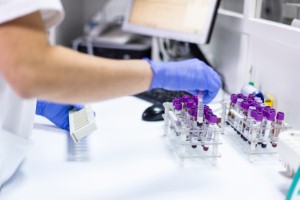News by Profession
- Audiology News
- Cardiac Physiology News
- Dietetics News
- Biomedical Science News
- Pharmacy News
- Phlebotomy News
- Radiography News
- Speech Therapy News
- Podiatry News
- Doctors News
- Sterile Services News
- Mental Health News
- Nursing News
- Mortuary News
- Physiotherapy News
- Occupational Therapy News
Biomedical Science Jobs by Duration
News Links
New blood test may lengthen prostate cancer prognosis rates

Latest Jobs
-
Biochemistry Biomedical Scientist Job
Speciality: Biochemistry Biomedical Scientist
Location: Beds and Herts
Duration: Temporary
-
Haematology / Blood Transfusion Band 6
Speciality: Haematology and BT Biomedical Scientist
Location: East Of England
Duration: Temporary
-
Histology Biomedical Scientist
Speciality: Histology
Location: South East Coast
Duration: Temporary
-
Haematology / Blood Transfusion Band 6
Speciality: Haematology and BT Biomedical Scientist
Location: London
Duration: Temporary
November sees the annual return of Movember, the month-long event that involves men being sponsored to grow their facial hair to raise money and awareness for male health issues, such as prostate cancer.
And as the month gets underway, news has broken that a simple new blood test could help to determine how likely patients are to respond to treatment for the disease, which affects one in eight men.
Carried out at the Institute of Cancer Research in London, the study saw 97 men undergo a simple test to find out their prostate cancer prognosis. Doctors hope the test will help prolong this for a greater number of men, as detecting their likelihood of responding to certain drugs early on in their illness allows medical professionals to explore alternative treatment options.
Dr Iain Frame, director of research at Prostate Cancer UK, explained: "We know that a one-size-fits-all approach to treating prostate cancer doesn't work.
"When the clock is ticking for a man with advanced prostate cancer, finding out early that his treatment needs changing can not only save precious time, but can also help avoid unpleasant side effects from a treatment that no longer works for him."
The study focused primarily on abiraterone, a drug designed to shrink tumours, but that only works for around 30 to 60 per cent of men, although it has fewer side effects than chemotherapy.
Doctors recruited 97 participants, looking at fragments of their prostate tumour DNA, as the drug works by attacking the male hormone receptor that attaches itself to prostate cancer cells. The researchers identified that certain mutations of the disease stopped abiraterone from working. If a man did not have these mutations, he was seven times more likely to respond positively to treatment.
Traditional biopsies are only able to measure a certain area, but by carrying out a blood test, doctors are able to pick up all mutations that are occurring in the body, meaning it can be extremely quick for medical professionals to determine an individual's capacity to respond to certain drugs.
This could significantly change the prostate cancer treatment landscape, potentially leading to the development of further new drugs, as well as lengthening the prognosis of a larger number of men, with experts believing it would be simple to implement the new blood tests in NHS hospitals.
A larger trial is now underway, involving some 600 cancer patients.
Dr Emma Smith of Cancer Research UK concluded: "If these important early results bear up in larger clinical trials, it could lead to a test which would indicate which patients might benefit more from trying other therapies instead."
The most recent statistics from the charity show that there were 41,736 new cases of prostate cancer diagnosed in Britain in 2011, with just under 11,000 men dying from the condition in 2012.
At present, prognosis rates for the disease are good, with around 85 per cent of men surviving for ten years or more after diagnosis, but with this new blood test on the horizon, this statistic could increase further in the near future.
Written by Martin Lambert
Mediplacements is a genuine specialist medical recruitment company. Contact us to see the latest biomedical science jobs.
Related News
-
Blood tests can quickly measure...
As tumours grow, new cancer cells replace old ones, which die off and release their DNA into the bloodstream....
-
Blood test could detect lung transplant...
Chronic transplant rejection can be deadly, and recognising it as early as possible is key to achieving the best...
-
Rapid-detection Ebola test developed...
The Ebola virus has the potential to spread very quickly from patient to patient, and therefore has caused...
-
Paediatric tumour test could lead...
A new tumour analysis test has been used to provide more information about cancer in children; something that...